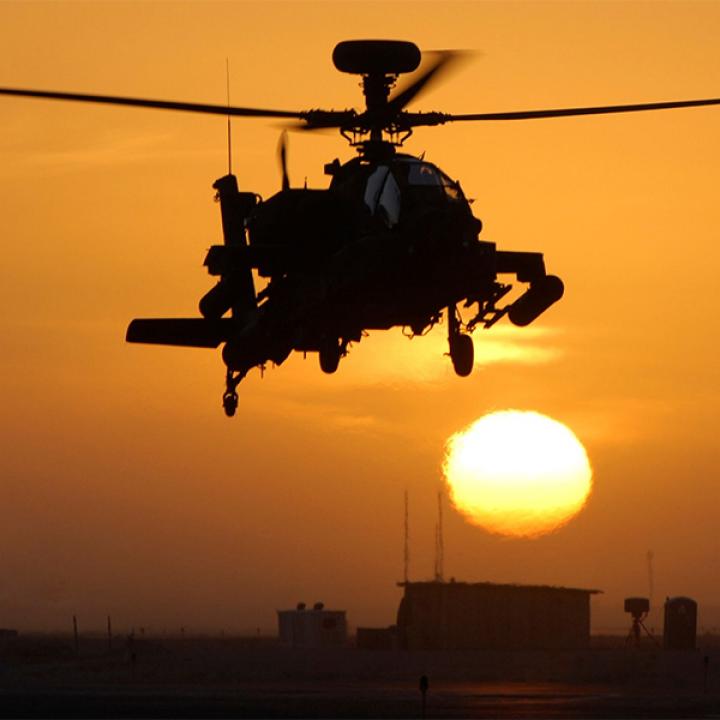

While delivering more Apache helicopters to Egypt may well increase the terrorist body count in the Sinai, Cairo must find a way to reduce the reportedly heavy collateral damage caused by such weapons.
Early next week, Congress will pass new legislation lowering the bar for transferring U.S. weapons to Egypt. Until now, the Obama administration had been prohibited by law from providing munitions to states in which democratically elected governments were removed by the military. Although the administration did not characterize the July 3 military action that deposed Muslim Brotherhood president Muhammad Morsi as a coup d'etat, it did suspend delivery of some weapons systems -- most prominently, ten Apache attack helicopters -- thereby straining the bilateral relationship. The new law obviates the no-coup requirement, instead conditioning the provision of military assistance on Egypt holding a constitutional referendum (which the country just completed this week) as well as parliamentary and presidential elections (tentatively slated for later this year).
Some may view the legislative change as a shift away from U.S. democracy promotion; others may view it as recognition of the reality on the ground in Egypt. Whatever the case, the pending Apache delivery is the line item receiving the most attention in Cairo and Washington. Yet even as they improve the climate of bilateral relations, the new law and the transfer of additional attack helicopters by themselves are unlikely to have a discernable impact on the trajectory of Egypt's burgeoning insurgency.
Cairo is currently in the midst of a campaign to establish security in the Sinai, where al-Qaeda affiliates have gained a foothold in recent years, raising concerns about terrorist spillover into the Nile Valley. Since July 2013 -- just after Morsi's removal -- some 350 policemen and soldiers have been killed in the peninsula. In late August, jihadists fired rocket-propelled grenades at a ship traversing the Suez Canal; fortunately, the vessel sustained no serious damage. Days later, Interior Minister Muhammad Ibrahim narrowly survived a car-bomb attack in the capital.
In addition to the positive optics associated with renewed weapons flows, Washington and Cairo see the delivery of more helicopters as potentially helpful in the campaign against Sinai-based militants. Egypt has been employing its existing Apaches, armed with Hellfire missiles, as its platform of choice in the peninsula, killing 184 militants as of last month, according to the military. It has acquired thirty-five of these helicopters from the United States since 1995, and paid $164 million in Foreign Military Financing dollars toward the ten awaiting delivery, or nearly all of the $171 million purchase price.
Those last ten aircraft are important because it is unclear how many of the initial thirty-five are still operational. Given Egypt's historically deficient maintenance and sustainment capabilities -- not to mention the questionable skills of its pilots -- several of the helicopters may be out of commission. While no Apaches have reportedly wrecked in recent Sinai operations, two jets -- including an F-16 -- have crashed during training exercises in the past four months alone.
Of course, Apaches alone will not be sufficient to quell the insurgency. In fact, the army's heavy-handed tactics in the Sinai, such as deploying helicopter-fired Hellfire antitank missiles in heavily populated areas, may be fueling support for al-Qaeda. A more effective model is the 2001 Israeli assassination of terrorist leader Ali Abu Mustafa, in which Apaches fired two antipersonnel missiles through a window in Ramallah, decapitating Mustafa as he sat at his desk -- Egyptian targeting is apparently not so precise.
For the most part, Egyptian journalists have been prevented from -- and even arrested for -- reporting on collateral damage. Yet Sheikh Ibrahim al-Manei, head of the Sinai tribal coalition, told one journalist that more than fifty civilians had been killed as of September, and more than 200 homes destroyed as of November. The numbers have no doubt increased since then.
Currently, the Egyptian military is committed to the counterterrorism campaign in the Sinai and is even threatening to target Hamas across the border in Gaza. Long the preserve of the General Intelligence Directorate (GID) or Mukhabarat, Sinai security is a relatively new responsibility for the Egyptian military. This is a welcome development for Washington, which had been pressing the military to take a more robust counterterrorism role in the peninsula since the GID's collapse in 2011. Yet the military's blunt-force capabilities may not be ideally suited to this mission.
Sinai has long proven a challenge for Cairo, even when the counterterror-focused GID in its prime administered the peninsula. For example, between 2004 and 2006, terrorists perpetrated a series of high-profile attacks, killing more than 100 foreigners and Egyptians. The lesson from Sinai, Iraq, the West Bank, and elsewhere is that successful counterterrorism policies require not just kinetic military activities, but a long-term intelligence/policing presence and oftentimes a real commitment to economic development.
Although it may be premature to judge the Egyptian military's nascent Sinai campaign, reporting and YouTube videos from the area suggest that damage to housing and infrastructure has been fairly extensive. Thus while the delivery and deployment of additional Apaches may well increase the terrorist body count, continued collateral damage would likely make the underserved Sinai Bedouin population even more resentful and, perhaps, sympathetic to al-Qaeda.
To paraphrase former defense secretary Donald Rumsfeld's 2003 "war on terrorism" memo, it is not clear that Egypt is capturing, killing, deterring, or dissuading more terrorists in the Sinai than al-Qaeda is recruiting, training, and deploying as a result of the ongoing counterterrorism campaign. Although few would question the wisdom of Cairo's current offensive, the government would be well advised to augment its military strategy with other, less lethal elements of national power to ensure that its victories are neither Pyrrhic nor short lived.
David Schenker is the Aufzien Fellow and director of the Program on Arab Politics at The Washington Institute.



